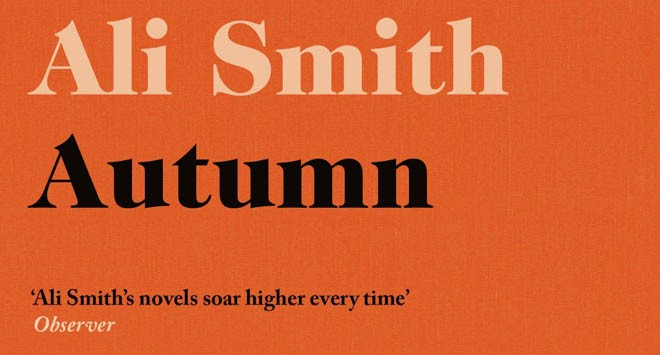
The novel, shortlisted for the Man Booker Prize 2017, can be described as experiential. It is a work of subtle feeling, a meditation on what art is and how it is formed

Ali Smith has dipped her pen into a crucible of leaves. That gargantuan heap of leaves that has just been raked. Autumn, in its varying states of loss and decay, is a season well-suited to montage. Pieces come apart. Structures are undone. Threads loosen. Smith’s book, shortlisted for the Man Booker Prize 2017, is being touted as the Brexit novel. That would be too definitive, and her novel is subversive, it takes aim at definition. It’s deliciously autumnal. Working from a palette - magenta, orange, and pink - Smith dips into the fragmentation of a deciduous Empire.
Making prose bound and howl like Smith does isn’t easy, in fact it’s unnatural. Take this line for example, "Crying came out of her like weather". Smith knows about you and your innermost child. She surprises, dishevelling assumptions, "He said it as if a time could be a place", beginning sentences with the meanings upside-down and side-by-side, deviating from formal grammar. All this play with language creates the feeing of being in the winnowed space of a very good poem. A poem that knows it’s a poem, that takes you inside itself, that unhinges you. This is a prose-poem, a leaf-fall. Smith is able to sustain it, even when very fine figurative writing can quickly drain. She knows about how much is just enough. She makes her words hunt and growl.
The novel takes us into different time sequences. Past-past. Present-past. Past-present. Present-present. In fact, you never know which time or space you’re going to land in next, what tense, or in which character’s mind. Whizzing by, chapters and subsections operate like wormholes. The story follows the life of Elisabeth Demand, a junior lecturer in the history of art, and her meetings with Daniel Gluck, a retired neighbour, now confined to a nursing home. These conversations and scenes occur when Elisabeth is 8, 11, 13, 18, and now 32 (in no particular order). Along the way encounter discussions on art, storytelling, and time. Smith approaches abstract theory from a place of sensitivity, and solicits a reinterpretation of themes of identity, temporality, and authenticity. The backdrop is Britain on the verge of Brexit, uncertain and detached, where simple trips to the post office and to the doctor take on absurd proportions; it seems as if the entire world is insane. And we are reminded it is, "It was the worst of times, it was the worst of times."
In Autumn, Smith extracts from naturalism, impressionism, surrealism, modernism, and postmodernism, and blends disparate techniques and modes of representation. She amalgamates aesthetic and conceptual processes from different periods, but through a postmodern brushstroke, utilising pastiche, kitsch, collage, cliché and montage. Often these postmodern tools are used to demonstrate the inherent instability and unreliability of meaning, to indicate the meaningless of meaning, but Smith doesn’t arrive at a void. Instead, she searches for an inexpressible depth of feeling, a centre for love and existence, unable to be expressed elsewhere. "But there are roses, there are still roses."
The novel can be described as experiential. It is a work of subtle feeling, a meditation on what constitutes and governs the imagination, on what art is and how it is formed. But it also searches for what it means to tell stories, to be a storyteller. Should there be restrictions levied on feeling? Should there be limits to the imagination? What is the true role of an adult? Should the imagination practice self-censorship?
If Autumn is read literally, with story and development in mind, there will be disappointment, for the narrative flits around, leaps wildly, goes deep into the inner most parts of fiction and imagination, the places where feelings come from, the shapes that they take. Smith borrows liberally from Dickens, reworking his message, re-layering it. We can feel echoes of Eliot as well as Hardy. This raises questions of plagiarism, re-writing, remoulding, and most importantly about enhancing. It also reflects on the nature of authenticity, who does a text really belong to, what constitutes truth?
Brexit has been described as a failure in imagination. A failure on the part of the British to imagine themselves in a space shared with difference. A time when Britain wants to crawl back into itself, into self-imposed and narrow meanings. To close itself away. To erect walls, the kind which linger in the background of the novel. Ali Smith is at a frontier, and it is in this reimagined place where space and time aren’t quite what we expect them to be, we discover an untranslatable humanism.